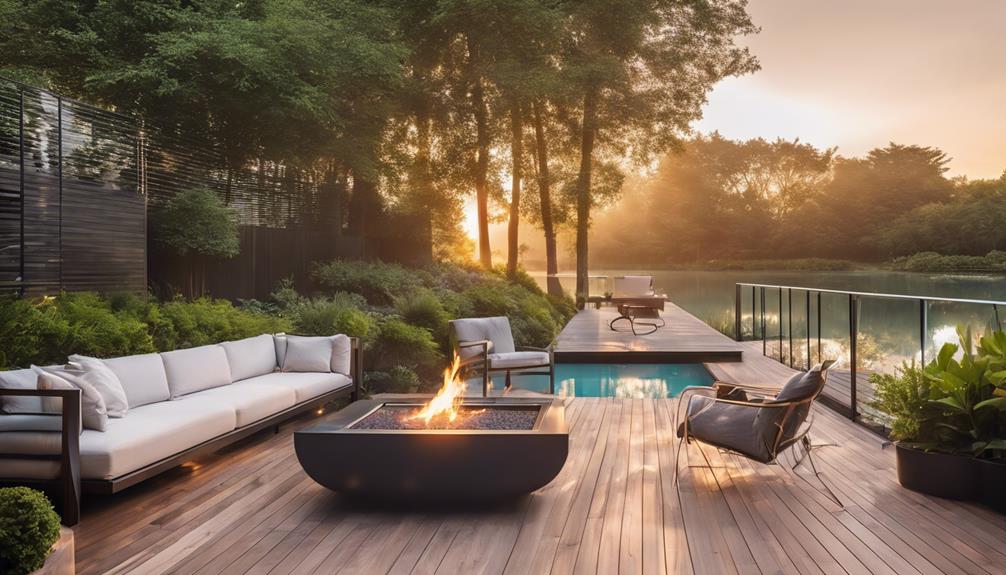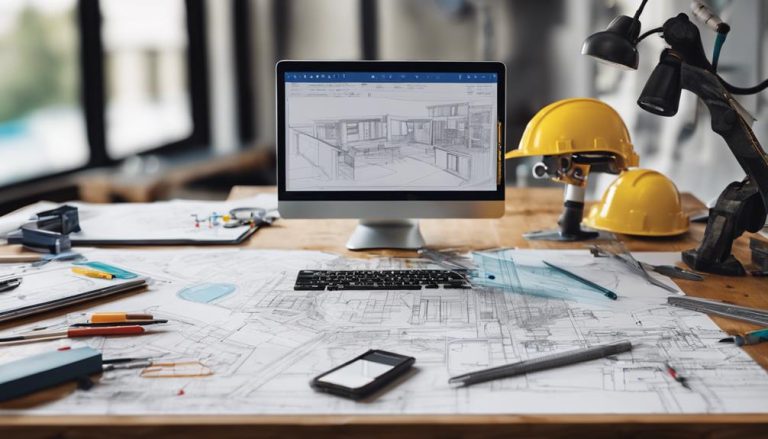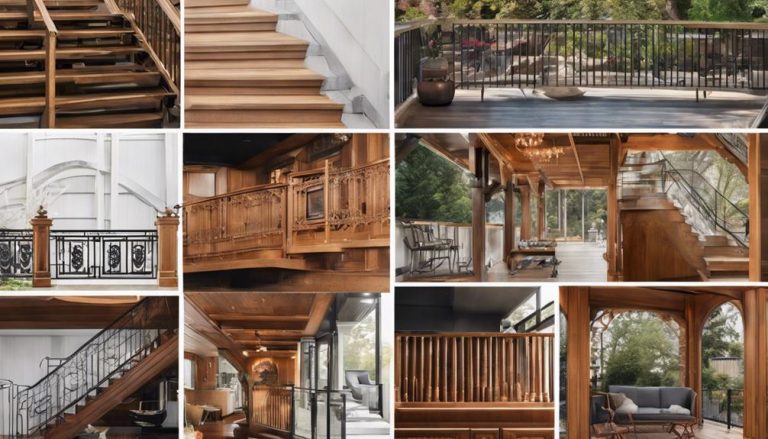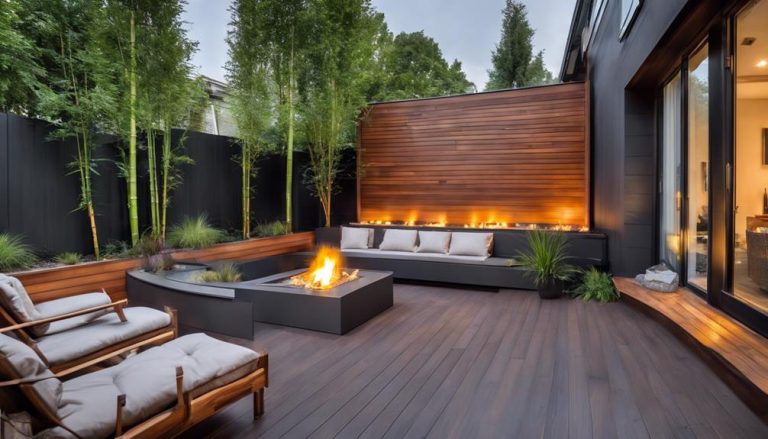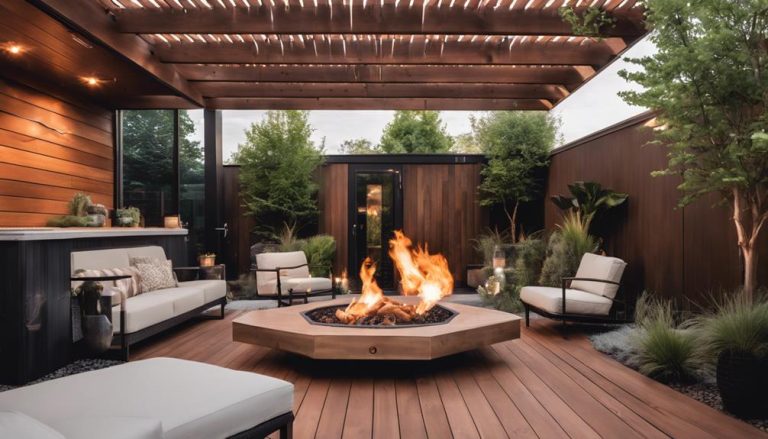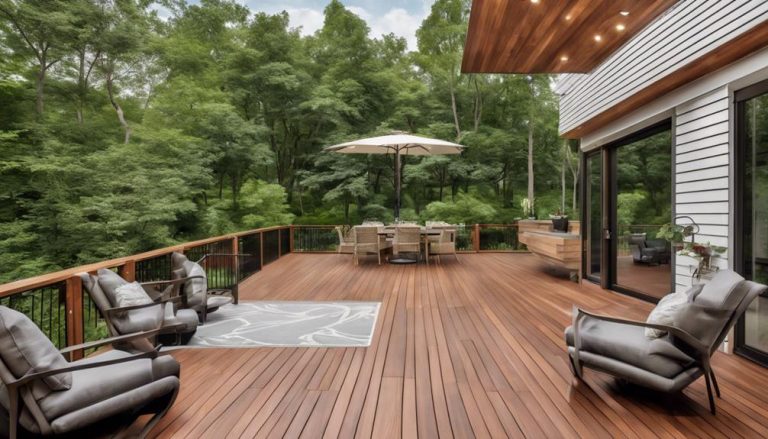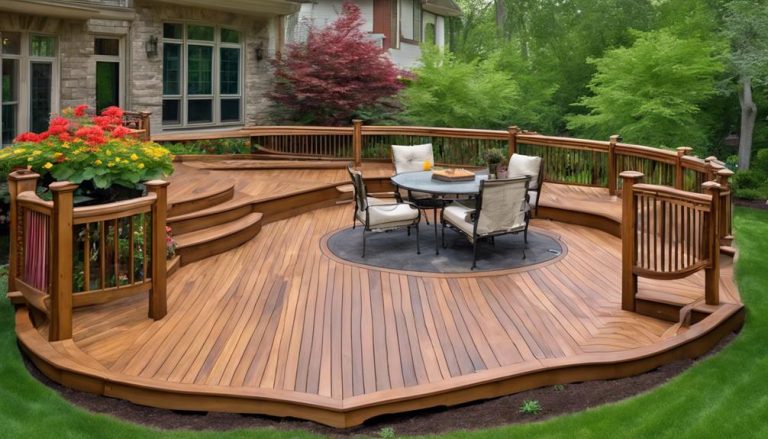Why You Should Follow Current Deck Design Trends
Adopting current deck design trends is critical in not only enhancing the visual and functional aspects of outdoor spaces but also in increasing property value considerably. By incorporating innovative materials like composite and aluminum, homeowners can guarantee durability and low maintenance. Minimalist aesthetic designs emphasize clean lines and natural palettes, creating serene environments. Sustainable design practices using eco-friendly materials and optimized use of natural resources align with ecological concerns. Additionally, smart lighting integration heightens energy efficiency and safety. Each of these elements contributes to a contemporary appeal that captivates and invites further exploration into the evolving dynamics of deck design.
Deck Builder Highlights
- Contemporary deck designs can enhance property value by aligning with architectural styles and sustainable trends.
- Innovative materials like composite blends ensure durability and eco-friendliness, appealing to environmentally-conscious buyers.
- Following current trends creates functional outdoor spaces, seamlessly extending indoor living for versatile use.
- Integrating smart technology and modern materials keeps decks relevant and attractive to prospective buyers.
- Minimalist aesthetics with clean lines create serene outdoor environments, enhancing relaxation and leisure appeal.
Modern Deck Design Explained
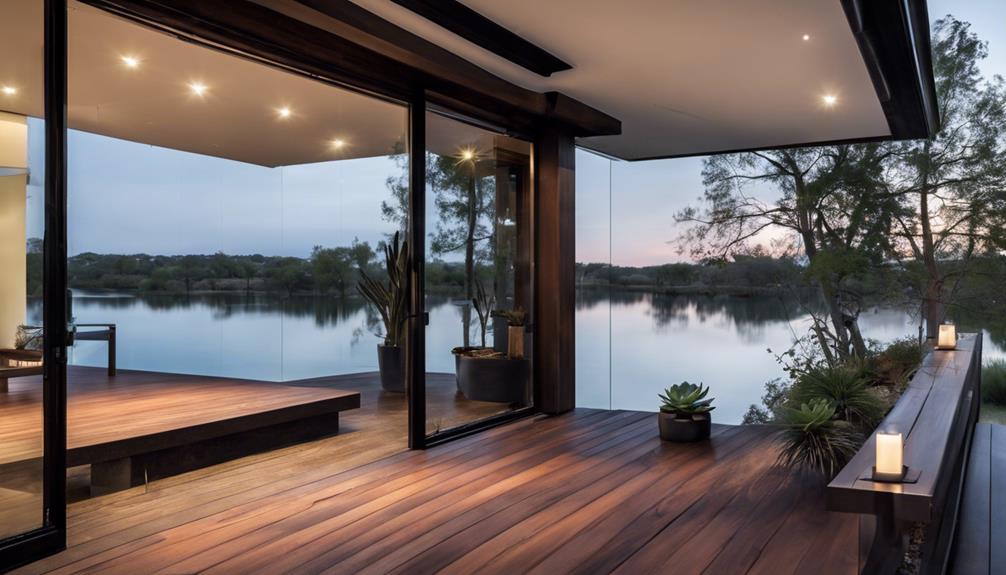
In modern deck design, the use of innovative materials such as composite decking or thermally modified wood is transforming outdoor spaces by offering durability and aesthetic flexibility. By integrating personal style with architectural features, these designs guarantee the deck seamlessly blends with the home, extending the living space outdoors.
The minimalist aesthetic appeal, characterized by clean lines and functional layouts, aligns perfectly with contemporary architectural styles and enhances the visual harmony between indoor and outdoor environments. Additionally, sustainable design practices are increasingly prioritized, with eco-friendly materials and low-impact construction techniques becoming integral to creating environmentally responsible living spaces.
Innovative Material Choices
With evolving technologies and an increasing demand for sustainability, the decking industry is embracing innovative material choices that reshape modern deck design. Increasingly, the focus is on composite materials made from a blend of wood fibers and recycled plastics, providing not only enhanced durability but also minimizing environmental impact. These materials are engineered to resist wear-and-tear from weather elements and are largely maintenance-free, reducing the need for frequent chemical treatments associated with traditional wood decking.
Another standout in this innovation frontier is thermally-modified wood, a process that removes organic compounds vulnerable to decay, resulting in greater longevity and resistance to insects and mold. This material marries the aesthetic appeal of wood with performance once exclusive to synthetic alternatives.
Further complementing these solutions, bamboo offers an eco-friendly material choice due to its rapid growth and self-regenerative properties. It delivers a similar aesthetic to traditional timber while being more sustainable. Aluminum also emerges as a viable alternative, known for its strength, lightweight properties, and recyclability, providing a modern and sleek finish.
These material innovations highlight a commitment to not only meet aesthetic standards but also address ecological concerns, ensuring decks are both beautiful and responsibly constructed.
Minimalist Aesthetic Appeal
Clean lines and simplicity define the minimalist aesthetic that is gaining traction in modern deck design. This approach emphasizes function and form, stripping away superfluous details to create a serene and uncluttered outdoor space.
By prioritizing open spaces and neutral color palettes, minimalist decks exude a sense of tranquility that perfectly complements their surroundings. The incorporation of sleek materials such as polished concrete, streamlined metal railings, and smooth planked wood enhances the understated elegance of minimalist design, creating an effortless shift between interior and exterior environments.
Minimalism in deck design also focuses on the relationship between the built environment and nature, enhancing the aesthetic value of the outdoor space. The strategic use of natural light and shadow plays a pivotal role, with expansive, unobstructed views and large, uninterrupted surfaces becoming a hallmark of this style.
Through careful planning, decks are designed to maximize spatial efficiency, incorporating hidden storage and multifunctional elements that offer practical solutions while maintaining the design's clean aesthetic.
This emphasis on a refined and cohesive aesthetic guarantees that minimalist deck designs remain timeless, appealing to those who seek a harmonious balance between beauty and functionality in their outdoor living spaces.
Sustainable Design Practices
Modern deck design not only prioritizes aesthetic appeal but also integrates sustainable practices, reflecting growing environmental consciousness. As homeowners increasingly seek to mitigate environmental impacts, sustainable deck construction has emerged as an indispensable trend, offering both ecological benefits and long-term savings. Utilizing eco-friendly materials, such as reclaimed wood and recycled composites, is central to this approach. These materials reduce deforestation pressures and decrease reliance on virgin resources while often requiring less maintenance compared to traditional options, thereby extending the deck's lifespan.
Innovative design strategies also contribute significantly to sustainability. Incorporating rainwater harvesting features or permeable materials that facilitate natural water drainage exemplifies a commitment to resource efficiency. Designs that maximize natural light can reduce energy consumption while strategically placed plants enhance biodiversity and create natural cooling effects. Moreover, choosing finishes and stains free from toxic chemicals minimizes harmful emissions and promotes healthier outdoor environments.
Project planning plays a pivotal role, with designers emphasizing precision to minimize waste during construction. Collaborative efforts with suppliers and builders ensure streamlined processes, further enhancing sustainability. By embracing these practices, modern deck design aligns with ecological stewardship, laying the foundation for environmentally responsible outdoor spaces.
Benefits
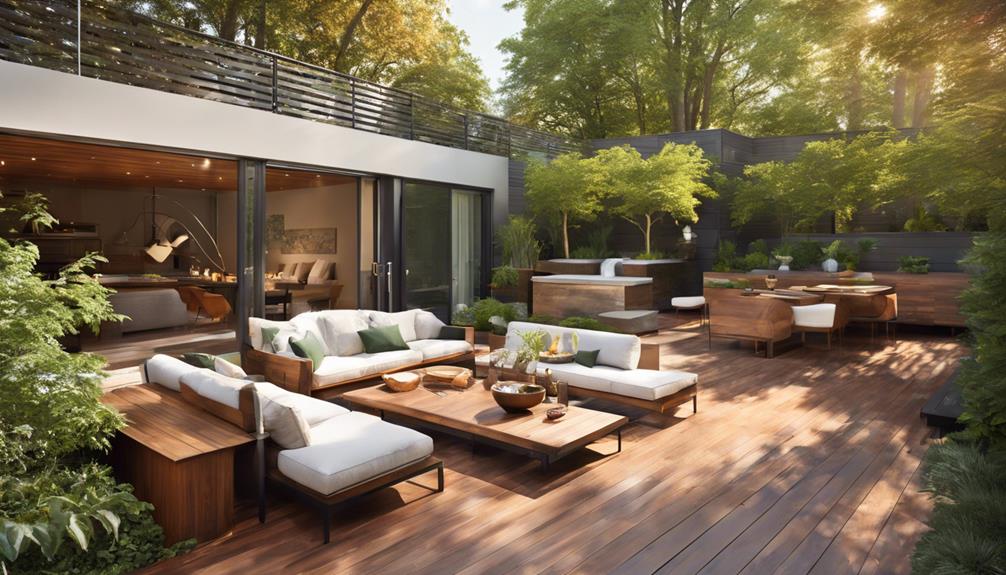
Embracing current deck design trends offers a multitude of benefits that can vastly improve a property's appeal and functionality. A well-designed deck not only elevates the outdoor aesthetic but also contributes to boosting property value by creating a desirable feature for potential buyers.
Enhance Outdoor Aesthetic
A well-designed deck transforms an outdoor space, enhancing its aesthetic appeal while offering several practical benefits. One of the primary advantages of following contemporary deck design trends is the ability to redefine the visual allure of your outdoor area. Modern design principles advocate for the harmonious integration of the deck with the natural surroundings, thereby creating an inviting atmosphere that not only catches the eye but also serves as a seamless extension of your home's architecture.
Utilizing a diverse palette of materials, such as composite decking, tropical hardwoods, or sustainably sourced timber, further elevates the visual interest of the space.
Furthermore, current trends emphasize the incorporation of multi-level designs, thoughtful lighting solutions, and innovative railing systems that contribute to both functionality and style. Elements like built-in seating, planters, and fire pits are strategically incorporated to enhance the deck's usability while also adding decorative value. These considerations, when meticulously planned and executed, establish a cohesive aesthetic that captivates visitors and provides an outdoor oasis suited for leisure and entertainment.
Boost Property Value
Beyond enhancing the outdoor aesthetic, contemporary deck design trends contribute considerably to boosting property value. A well-constructed deck is often a prized feature that entices potential buyers by promising both functionality and appeal.
More than an outdoor extension, a deck represents a versatile asset that can elevate a home's market competitiveness. Current trends emphasize sustainable materials, innovative designs, and seamless integration with architectural themes, enhancing the property's allure.
A key factor in deck design that can greatly impact property valuation is material choice. High-quality, durable materials guarantee longevity and minimal maintenance, positioning the home as a sound investment. Additionally, sophisticated finishes harmonize with the home's aesthetic, setting it apart in competitive real estate markets.
Designers and homeowners alike are increasingly leaning towards customization, creating unique space that reflects personal style and enhances desirability.
To summarize, investing in a modern deck can increase the home's market value by:
- Using premium materials that guarantee longevity and reduce maintenance.
- Incorporating unique design elements that differentiate the property.
- Aligning with architectural trends that elevate aesthetic consistency.
Increase Functional Space
Enhancing a property's functional space through thoughtful deck design provides tangible benefits that extend beyond mere aesthetics. Modern deck configurations are increasingly focused on optimizing the usability of outdoor areas, thereby transforming them into versatile extensions of indoor living spaces.
A well-designed deck can accommodate a range of activities, from casual family gatherings to formal garden parties, thus maximizing the utility of available outdoor space.
Innovative deck designs incorporate multi-level layouts that create distinct zones for dining, relaxation, and entertainment, allowing homeowners to tailor these spaces to their specific needs and preferences. Additionally, the integration of built-in seating, planters, and lighting solutions enhances the usability of these outdoor extensions while simultaneously elevating their visual appeal. This thoughtful design approach promotes seamless transitions between functional areas, fostering an inviting environment conducive to both social interaction and solitary relaxation.
Furthermore, advances in construction materials, such as composite decking, facilitate lower maintenance and increased durability, ensuring the deck remains a valuable asset over time. By leveraging these deck design trends, homeowners can considerably augment their outdoor living areas, enriching the property's livability and expanding its potential uses considerably, while maintaining aesthetic coherence with the primary structure.
Stay Modern and Relevant
While optimizing functional space adds practicality, maintaining a modern and relevant deck design offers a competitive edge in the real estate market. Staying aligned with current design trends can vastly enhance the appeal and valuation of a property. Prospective buyers are keenly aware of contemporary aesthetics, making it imperative for homeowners to integrate cutting-edge designs and materials. By guaranteeing your deck remains stylish, not only does it improve visual appeal, but it also signals to the market that the entire property is well-maintained and thoughtfully curated.
Adopting modern design trends in decking involves incorporating elements that resonate with current architectural styles, colors, and textures. This approach positions a property as forward-thinking and adaptable to evolving consumer preferences. The benefits extend beyond aesthetics and into functionality, offering a refreshed perspective on space utilization.
Moreover, keeping pace with design innovations can provide the following advantages:
- Sustainability: Utilize eco-friendly materials to meet increasing environmental concerns of buyers.
- Technology Integration: Incorporate smart technology to enhance outdoor living experiences.
- Customization: Offer bespoke design features that cater to individual lifestyle needs.
Ultimately, maintaining a modern deck guarantees relevance in a competitive and dynamic real estate landscape.
Smart Lighting Integration Benefits
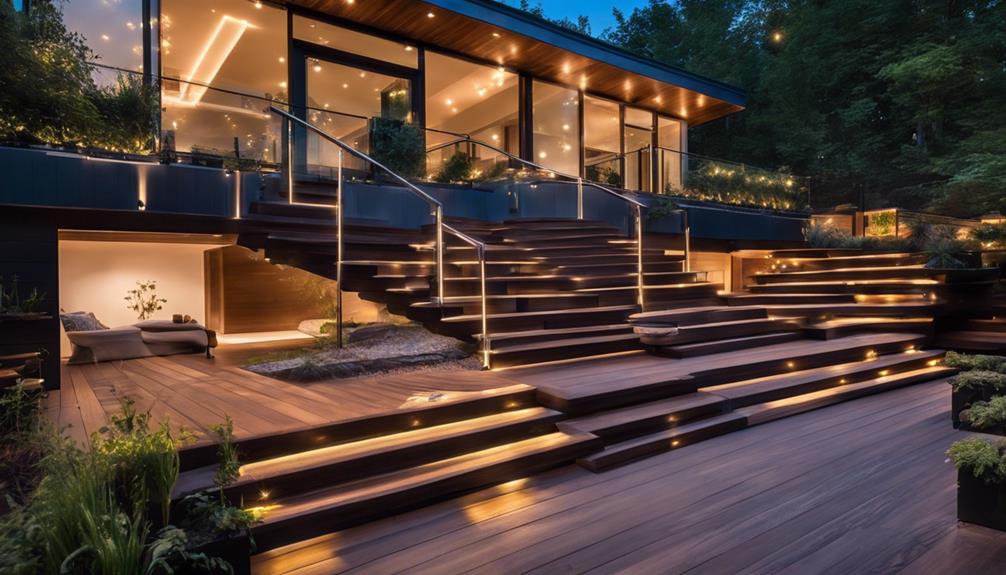
Embracing smart lighting integration within deck design offers substantial benefits, merging technology with functionality to uplift both energy efficiency and the aesthetic appeal of outdoor spaces. By incorporating intelligent lighting systems, homeowners can greatly reduce energy consumption while also enhancing the safety of decks during nighttime use, as smart lighting can be programmed to respond to various environmental cues and user preferences. The convergence of these benefits is illustrated in the table below, showcasing a concise breakdown of how smart lighting transforms deck environments:
| Benefit | Description |
|---|---|
| Energy Efficiency Boost | Reduced energy consumption through automated and adaptive use. |
| Enhanced Aesthetic Appeal | Dynamic lighting solutions create visually mesmerizing spaces. |
| Improved Safety Features | Increased safety with sensor-based lighting for darker areas. |
Energy Efficiency Boost
Smart lighting integration is revolutionizing how homeowners conceptualize energy efficiency in deck design. By incorporating advanced lighting solutions that respond to environmental conditions and usage patterns, decks are becoming more than just outdoor spaces; they are transforming into energy-efficient havens. Smart lighting systems not only reduce energy consumption through automated controls and adaptive illumination but also integrate seamlessly with solar panels and other sustainable energy sources, ensuring minimal reliance on conventional energy grids.
The advantages of smart lighting are manifold, particularly in enhancing the energy efficiency of deck spaces. Key benefits include:
- Automated Operation: Smart lighting systems can be programmed to switch on or off based on the time of day, occupancy, or ambient light levels, thus minimizing unnecessary energy utilization.
- Zonal Control: Offering the ability to illuminate specific areas of the deck, ensuring that light is only used where and when it is needed, a feature that contributes enormously to energy savings.
- Remote Management: Homeowners can control the lighting from anywhere via smartphone apps, allowing them to adjust settings to optimize energy efficiency based on immediate needs or changing environmental conditions.
With technological advancements extending the capabilities of these systems, smart lighting stands as a cornerstone of modern, energy-efficient deck design.
Enhanced Aesthetic Appeal
The transformative power of smart lighting goes beyond energy efficiency, substantially enriching the aesthetic appeal of modern decks. By adopting advanced lighting systems, homeowners can craft visually striking environments that emphasize architectural features, textures, and colors far more effectively than traditional lighting systems. The multidimensional light effects—whether ambient, task, or accent lighting—provide depth and character, accentuating the spatial design while simultaneously complementing its functional use.
Key to this enhanced aesthetic appeal is the ability of smart lighting to adapt dynamically. With programmable schedules and adjustable color temperatures, lighting can be tailored to suit different moods, times of day, or specific occasions, enhancing both the ambiance and personalizing the overall experience. Imagine transforming your deck from a serene, candlelit dinner setting to a vibrant space for social gatherings, all with the touch of a button or a simple voice command.
Furthermore, integration with home automation systems allows for seamless synchronization with other smart devices, maximizing both convenience and style. Whether it's the creation of subtle lighting pathways or vibrant color displays, smart lighting solutions offer diverse design possibilities, reflecting modern trends that prioritize both function and form in exterior spaces.
Improved Safety Features
Beyond enhancing aesthetic appeal, modern deck design now also incorporates smart lighting to greatly boost safety features. Smart lighting systems are revolutionizing outdoor spaces by providing well-illuminated areas that minimize potential hazards.
These innovative lighting solutions can be programmed to operate at specific times of the day, ensuring that visibility remains excellent during both dusk and dawn, when the risk of accidents tends to increase. By integrating motion sensors, these systems can automatically illuminate pathways as an individual approaches, offering an intuitive response to environmental changes and substantially enhancing pedestrian safety.
Moreover, the use of smart lighting helps to highlight critical areas such as stairs, edges, and railings, ensuring users are always aware of their surroundings. This focus on safety through advanced technology not only protects residents and guests but also adds value to the property by appealing to prospective buyers who prioritize security in their outdoor settings.
Automatic Activation: Motion sensors trigger lights only when necessary, optimizing energy consumption.
Programmable Schedules: Customized lighting schedules adapt to seasonal changes, maintaining safety throughout the year.
Emergency Connectivity: Some smart systems connect to home security networks for added safety during emergencies.
Smart lighting integration truly redefines the safety parameters of contemporary deck design.
Decks FAQ
How Does Following Deck Design Trends Impact Resale Value?
Following deck design trends can drastically enhance a property's appeal, potentially increasing resale value. Modern, aesthetically pleasing designs attract prospective buyers, offering a competitive edge in the real estate market by aligning with contemporary preferences and expectations.
Are There Eco-Friendly Materials That Fit Current Deck Design Trends?
Yes, incorporating eco-friendly materials like composite decking, reclaimed wood, and bamboo aligns with current deck design trends. These materials not only enhance aesthetic appeal but also contribute to sustainability, meeting the growing demand for environmentally conscious construction.
What Are the Cost Implications of Following Deck Design Trends?
Adopting current deck design trends can entail significant costs due to premium materials and modern features. Budgetary considerations include initial construction, ongoing maintenance, and potential increased property value. Thorough financial planning guarantees alignment with design aspirations and financial capacity.
How Do Climate Conditions Affect Trendy Deck Design Choices?
Climate conditions markedly influence deck design choices by dictating material durability and suitability. Regions with high humidity may prefer composite materials, whereas areas with intense sun exposure might opt for UV-resistant finishes to extend a deck's lifespan.
Can I Incorporate Smart Features Into Existing Deck Designs?
Integrating smart features into existing deck designs is feasible by employing wireless technology and modular systems. Enhance functionality through smart lighting, weather sensors, and automated controls, ensuring seamless integration while preserving the deck's aesthetic and structural integrity.

